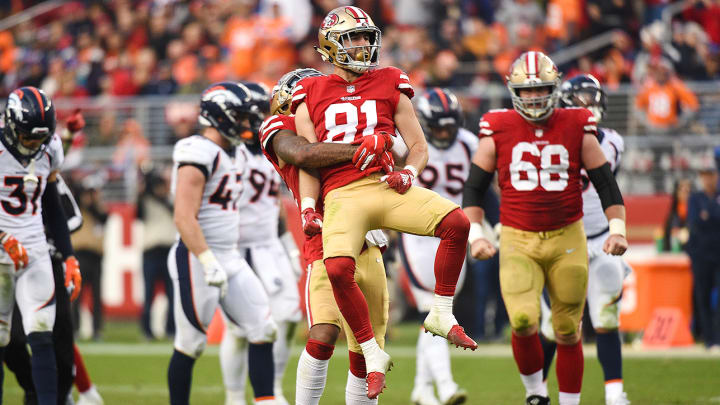The Confusion of Watching the NFL’s Worst Teams Get Counterproductive Wins

The NFL’s Week 14 games contained so many eye-popping moments—Miami’s miracle, the last few minutes of regulation in Eagles-Cowboys, the touchdown-free Rams, the Giants’ 34-point first half—that it was easy to overlook a trio of results that would have been stunning on any other weekend: Wins by the Raiders, 49ers and Jets.
These wins were not gimmes either, to the extent that the league’s worst teams can have anything like gimmes. Oakland beat Pittsburgh, who remained in the AFC North lead after the loss. San Francisco beat Denver, a hot team that had won three straight—two of those over the playoff-positioned Steelers and Chargers. The Jets won on the road against a Bills team that beat them by 31 points a month ago in their building while starting Matt Barkley at quarterback. These wins took not just good bounces and bad turf but preparation, effort and drive.
Did these victories help the winning teams, though? The three teams entered the weekend, based on their records and strength of schedule, as the NFL’s three worst. The two Bay Area clubs, with 2–10 records, were Nos. 1 and 2; they exited as the No. 1 worst (San Francisco) and the No. 3 worst (Oakland). The Jets moved from No. 3-worst to No. 5. (Incidentally, the second-worst team overall, Arizona, would have unquestioned possession of the league’s worst record had they not topped the Packers in Green Bay in a 20–17 Week 13 victory so dispiriting for Cheeseheads that Mike McCarthy was sliced off afterward.) That looks like progress.
But before Sunday’s games, according to Football Outsiders, the 49ers had a 59% chance of earning the draft’s No. 1 pick, with Oakland having a 23% chance and the Jets having a 12% chance. After Sunday’s games the Cardinals now have a 47% chance, with the 49ers at 34%, Oakland at 11%, and the Jets at 5%.
MMQB: Miracles, Mistakes and Playoff Momentum—Week 14 in the NFL
The winning clubs appear to have all booted themselves one place further away from the No. 1 overall draft pick for negligible 2018 gains—we’ll call it the feel-weird win. To wit: Jon Gruden’s Raiders, who needed another 2018 win probably most out of the three teams so that they might convince the football world that things were not as chaotic and hopeless as they seemed, fired general manager Reggie McKenzie on Monday. So much for momentum.
We ought to be thankful that full-on tanking—as practiced in MLB, NHL and NBA—hasn’t made its way to the NFL. It wouldn’t make a ton of sense because coaches’ and executives’ seats are too hot to waste full seasons; players’ careers peak and end too quickly; and there’s enough parity and game-to-game variance that even a franchise as ramshackle as the Jaguars can end the 2017 season four points away from a Super Bowl berth. And if an NFL team went into each Sunday’s game as unprepared as recent tank-tastic iterations of the Astros, Sixers and Oilers, someone might get killed. But that’s not to say teams won’t end up trying it.
On days when I’m not on the clock as America’s most professional and impartial sportswriter, I happen to cheer for one of these teams—the one that hasn’t sniffed a Super Bowl appearance since the moon landing—and as I watched Sunday’s come-from-behind win I wasn’t sure exactly what I was feeling. It wasn’t elation. The Jets had no reason to win this game. (Sorry, Herm.) The team had lost six in a row before heading to Buffalo, and a six-game losing streak in the meaty part of an NFL schedule will usually do a number on a team that wasn’t strong to begin with. At 0-6, there’s hope, however faint. At 3-9, there’s no hope, only exhaustion. Those losses had effectively ended Todd Bowles’s tenure as head coach and with it all hope of even a respectable season, leaving the Jets with nothing to play for but the development of their 21-year-old quarterback (who missed the last three of those games with an injury of murky severity). And, right, their spot in the 2019 draft order.
VRENTAS: A Brief History of the Patrick Mahomes No-Look Pass
When juxtaposed with the struggles of No. 3 overall pick Darnold and the draft-pick price the Jets paid to move up three spots to get him, the sensational debut of No. 1 overall pick Baker Mayfield in Cleveland highlights just how wide the gulf can be from pick to pick, and just how unhelpful it is to be the NFL’s sixth- or seventh- or fifth-worst team. The Jets, though, seem destined again for such a position, all because Darnold and his coaches and teammates had the gall to win in Week 14. (What about the intangible character-building value of such a win? you may ask. Jared Goff went 0–7 in his rookie-year starts; in year two, he went 11–4. A quarterback does not need to win to develop.)
The NFL, for all its fondness for byzantine structures, has never adopted an NBA- or NHL-style lottery to inject some uncertainty into the draft order and disincentivize teams from losing out. It’s hard to imagine anything short of a Browns dynasty pushing owners to do so. But if teams are wounding their futures by going 5–11 instead of 4–12, or 4–12 instead of 3–13, the issue at least deserves some study. Watching a feel-weird win is no way to waste a Sunday.
